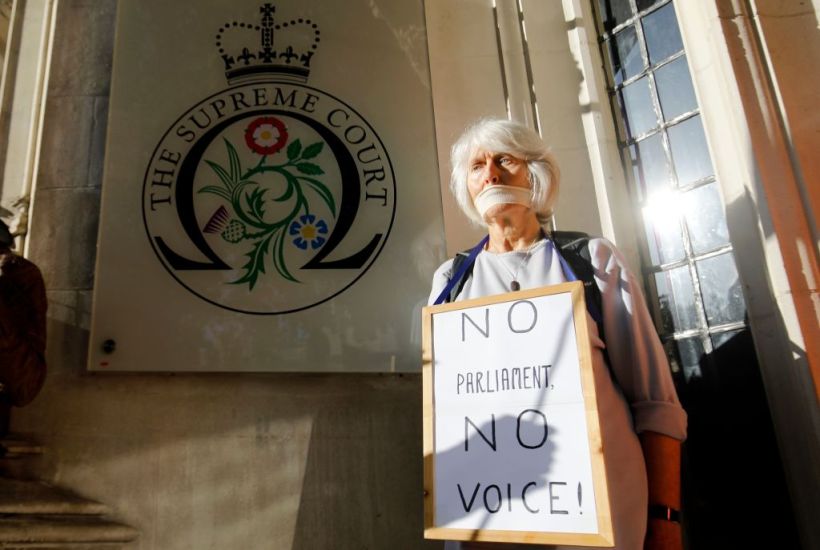The decision of the British Supreme Court regarding the Queen’s order to prorogue Parliament contains the following:
- The 17th century was a period of turmoil over the relationship between the Stuart kings and Parliament, which culminated in civil war. That political controversy did not deter the courts from holding, in the Case of Proclamations (1611) 12 Co Rep 74, that an attempt to alter the law of the land by the use of the Crown’s prerogative powers was unlawful. The court concluded at p 76 that “the King hath no prerogative, but that which the law of the land allows him”, indicating that the limits of prerogative powers were set by law and were determined by the courts.
While I presume that Lady Hale wrote the judgment any fair reading of the cited passage would conclude that what she cites does not agree with what she understand it to mean. For the citation says that the existence of the prerogative is a matter of the law of the land. In that case Lord Coke held that the King did not have a prerogative power to create criminal offences.
Lady Hale, however, says that the case permits the Court to determine the limits of prerogative powers. If it is accepted that King has a prerogative power to create criminal offences, the Court could determine its limit; whether the power applied to capital offences or only property offences or only tortious offences of the person, etc.
Lady Hale’s statement is not supported by the authority she cites. If we bear in mind that she agrees that the Queen has a prerogative power to prorogue the Parliament, we can see that her misstatement at this point, now allows her to determine the limits of the prerogative to prorogue the Parliament, a power which, hitherto, did not exist once the prerogative power had been established. There is, for example, no limit on the prerogative power of the government to declare war and the prospect of a Court issuing an injunction to prevent the mobilisation of forces to defend the nation is laughable. But it follows from Lady Hale’s judgment.
What is the prerogative? It was never better explained than the definition given by the English scholar, John Locke:
- … Prerogative being nothing but a power, in the hands of the prince, to provide for the public good, in such cases, which depending upon unforeseen and uncertain occurrences, certain and unalterable laws could not safely direct (Two Treatises II: para 158)
Having agreed that the prorogation of Parliament is a prerogative power, and that the monarch must comply with Ministerial advice, Lady Hale concludes:
- … That situation does, however, place on the Prime Minister a constitutional responsibility, as the only person with power to do so, to have regard to all relevant interests, including the interests of Parliament.
There is a certain irony in that sentence for, as a general principle, the debates in the Westminster Parliament are not admissible in any court of law to determine the meaning of the law. But they are suddenly the sine qua non of democracy even though the UK is a monarchy, not a democracy, and it’s the House of Commons is the only representative chamber. The House of Lords being appointed by the Queen’s exercise of her prerogative power, which is how Brenda Marjorie Hale became Baroness Hale of Richmond.
What specific interest does the Parliament have when the prerogative is to be exercised. Lady Hale cites the opinion of Lord Browne-Wilkinson that the prerogative powers of the Crown had been made subject to the “overriding power of the democratically elected legislature as the sovereign body.” [para 41]
Had Lord Browne-Wilkinson read Madison’s Federalist Papers, Aristotle’s Politics or Plato’s Laws, he would have known that an elected legislature is not a sign of a democracy.
Lady Hale, however, has used a quote which offers no insight into the issue before the Court but which sounds politically attractive. Perhaps she did not notice that the power to prorogue has not been overridden by legislation. That is something that the Parliament could have done at any time since Johnson was elected Prime Minister, but hasn’t. The power to prorogue exists, still, and Lady Hale admits as much.
Exhibiting a lamentable lack of knowledge of the relation between the Crown, the executive and the legislature, Lady Hale assumes that parliamentary rhetorical flourishes, party propaganda by another name, which will be forthcoming once the Parliament is recalled, sufficiently satisfies her idea of parliamentary sovereignty.
- … An unlimited power of prorogation would therefore be incompatible with the legal principle of Parliamentary sovereignty.
That statement, however, would be meaningless were the government possessed of a majority in the House of Commons.
The fact that no motion of confidence has been called for or passed by the House of Commons since the day Boris Johnson was elected as Prime Minister should have alerted the Court to the fact that it was being used as a tactic to advance the interests not of the Parliament, but of that minority who voted against Brexit at the referendum and lost.
Got something to add? Join the discussion and comment below.
Got something to add? Join the discussion and comment below.
Get 10 issues for just $10
Subscribe to The Spectator Australia today for the next 10 magazine issues, plus full online access, for just $10.


























Comments
Don't miss out
Join the conversation with other Spectator Australia readers. Subscribe to leave a comment.
SUBSCRIBEAlready a subscriber? Log in